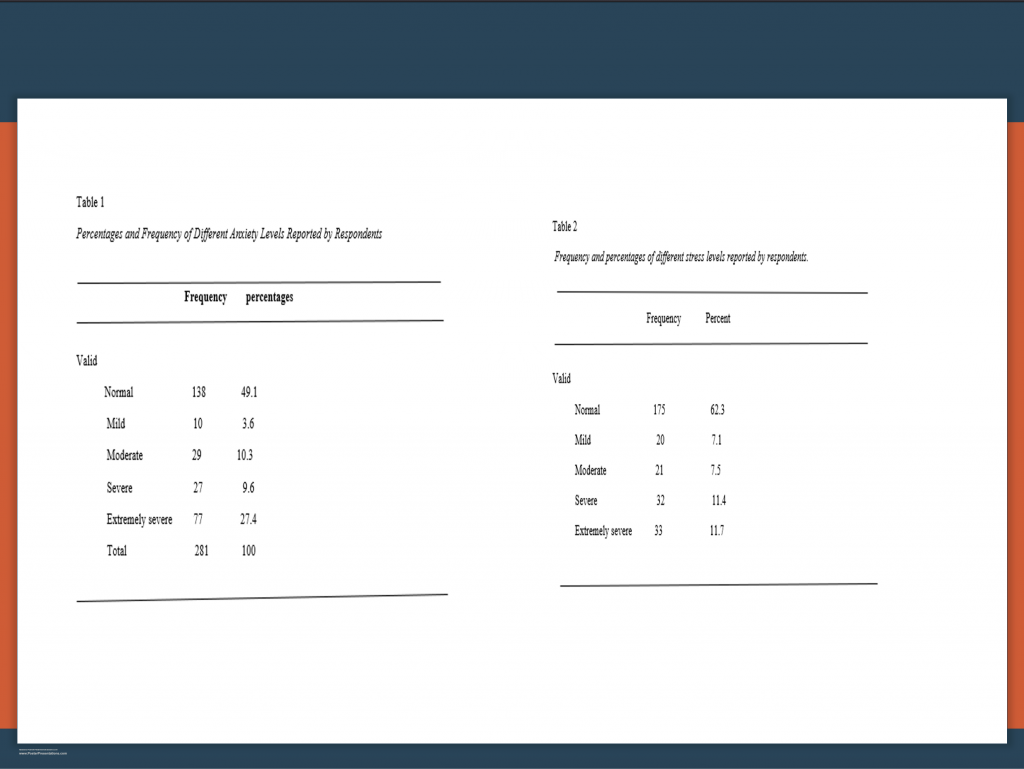Ahmed Ali D, Ahmed Ali I, Maheshwari C. Assessment of mental health status of public of pakistan during the corona virus pandemic. HPHR. 2022;6.

The corona (COVID-19) pandemic has become a global concern and has impacted people worldwide. The research data is needed to formulate psychological interventions to lower the anxiety and stress levels in Pakistan. The aim of the study was to assess the anxiety and stress levels among the public of Karachi during COVID-pandemic.
From 2020/04/29 to 2020/05/03, data was collected through an online survey regarding age, gender, education level, profession, physical symptoms in the past 14 days, knowledge and concerns about COVID-19, and precautionary measures against COVID-19. Depression, Anxiety, and Stress Scale (DASS-21) were used to assess mental health status. This study included 281 respondents from Karachi. Results In total 37.91% of respondents reported severe to extremely severe anxiety symptoms, 23.13% reported severe to extremely severe stress symptoms. Many respondents were satisfied with the health information available (81.85%), spent 20 to 24 hours at home (90.75%), and took precautionary measures (98.22%). Students, matric education level, belonging to age group 20 to 30, 20 to 24 hours spent at home, showing concern related to family getting COVID were associated with higher anxiety levels (P<0.05). Reporting physical symptoms, avoiding going out, and staying at home < 10 hours were associated with lower levels of anxiety(P<0.05).
Previous researchers found female gender were at high risk of depression. [1] This research shows no association between gender and anxiety. In this study, anxiety levels were positively associated with students and matric education level and belonging to the age group of 20 to 30. These vulnerable groups need urgent attention regarding mental health. Secondly, knowledge and awareness related to COVID-19 were protective factors related to anxiety among the respondents. Media plays a very important role in making people aware of COVID-19. Government should promote media to aware people of COVID-19 and should keep a check and balance on it so that inappropriate or violent content should be restricted. Government and health authorities should provide accurate health information to reduce the impact of rumors; Moreover, related to physical symptoms, this study contradicts the previous researcher’s results which indicates its association with high anxiety [2] but in this study physical symptoms were associated with low anxiety and stress.
Thirdly, this study indicates, showing concern related to COVID-19 was an associated risk factor related to anxiety and stress among the respondents. Government should introduce online relaxation activities to reduce panic and worry among the people. Furthermore, other researchers found applying precautionary measures was a protected factor related to high anxiety and stress among people. [3]. This study corresponds to it. Applying precautionary measures especially maintaining social distancing was an associated risk factor related to stress and anxiety among the respondents while avoiding going out was a protective factor related to anxiety hence government should recommend people to stay at home.
During the outbreak of the corona pandemic, more than one-third of respondents reported severe to extremely severe anxiety and more than one-fifth reported severe to extremely severe stress. Our findings will help to identify vulnerable groups which are most likely to get affected psychologically by the COVID pandemic; This research will help to formulate psychological interventions to improve the mental health of vulnerable groups reporting high anxiety and lower the psychological impact of the outbreak.
1 Lim GY, Tam WW, Lu Y, Ho CS, Zhang MW, Ho RC. Prevalence of Depression in the Community from 30 Countries between 1994 and 2014. Sci Rep. 2018 Feb 12;8(1):2861. doi: 10.1038/s41598-018-21243-x. PMID: 29434331; PMCID: PMC5809481.
2 Wang C, Pan R, Wan X, Tan Y, Xu L, Ho CS, Ho RC. Immediate Psychological Responses and Associated Factors during the Initial Stage of the 2019 Coronavirus Disease (COVID-19) Epidemic among the General Population in China. Int J Environ Res Public Health. 2020 Mar 6;17(5):1729. doi: 10.3390/ijerph17051729. PMID: 32155789; PMCID: PMC7084952.
3 Leung GM, Lam TH, Ho LM, Ho SY, Chan BH, Wong IO, Hedley AJ. The impact of community psychological responses on outbreak control for severe acute respiratory syndrome in Hong Kong. J Epidemiol Community Health. 2003 Nov;57(11):857-63. doi: 10.1136/jech.57.11.857. Erratum in: J Epidemiol Community Health. 2003 Dec;57(12):995. PMID: 14600110; PMCID: PMC1732323.
BCPHR.org was designed by ComputerAlly.com.
Visit BCPHR‘s publisher, the Boston Congress of Public Health (BCPH).
Email [email protected] for more information.
Click below to make a tax-deductible donation supporting the educational initiatives of the Boston Congress of Public Health, publisher of BCPHR.![]()
© 2025-2026 Boston Congress of Public Health (BCPHR): An Academic, Peer-Reviewed Journal
All Boston Congress of Public Health (BCPH) branding and content, including logos, program and award names, and materials, are the property of BCPH and trademarked as such. BCPHR articles are published under Open Access license CC BY. All BCPHR branding falls under BCPH.
Use of BCPH content requires explicit, written permission.